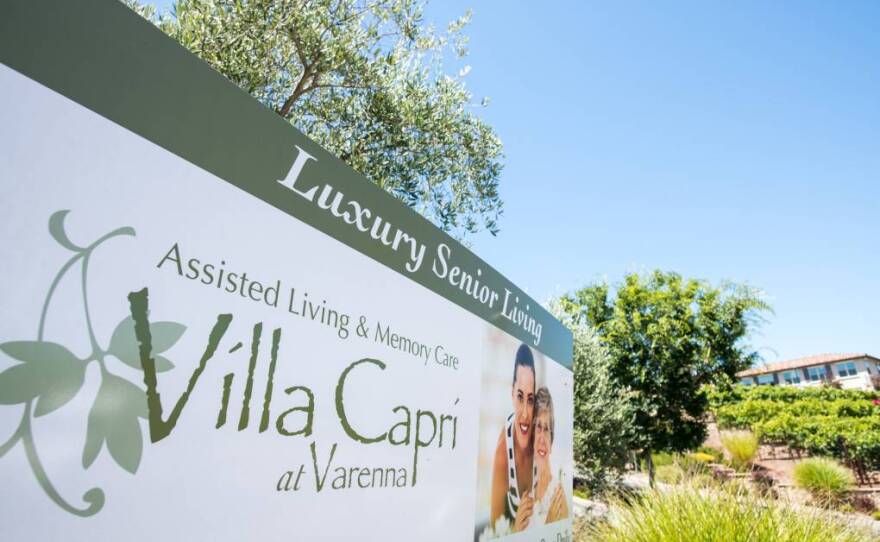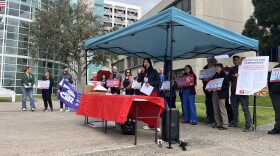This guide is part of our Older and Overlooked series on the danger wildfires pose to California's older population, especially during COVID-19.
Skip straight to:
The coronavirus pandemic is a sudden, new threat to assisted living and skilled nursing homes — and those facilities already are under increasing threat from wildfire in California.
A KQED investigation found thousands of long-term care homes at heightened risk for wildfire, and public records paint a murky picture about how well state agencies check that they’re ready for disasters.
“We are not at all prepared,” says state Sen. Hannah-Beth Jackson.
But there are ways to help loved ones in a care home — or to advocate for them yourself, as their relative — during times of crisis.
Emergencies: Do Your Research, Know Your Rights
Experts recommend staying involved when a loved one moves to a residential community for the elderly or a skilled nursing facility — and they say to know your rights.
'We have an expectation that our family members are going to be cared for. That's not always necessarily aligned with what's really going to happen in an emergency.'
— Crista Barnett Nelson, long-term care ombudswoman in Sonoma County
So where should you start? First, you can use our map to see whether the facility is in a fire zone, and what kind of risk that might pose.
You can also look up inspection records, complaints, and other enforcement actions for assisted living, with the facility search at the Department of Social Services. You can additionally use the Department of Public Health’s Cal Health Find tool for nursing homes.
“What do I ask my loved one’s nursing home?” The questions experts recommend
Also, get to know resources and advocates in the area in which the facility's located. Every county has a long-term care ombudsman — a public advocate for residents and their families. You can contact them if you have specific concerns about a facility.
Trade associations representing long-term care homes lobby about legislation and share operating tips with members. Nursing home operators in California have created a disaster preparedness program including a boilerplate disaster plan that their members sometimes use. And assisted living operators have put together guides for dealing with the pandemic.
Could You Take Over?
The people who run a care home may expect you to come get your family member during a disaster: whatever plan you make for your own family, consider whether you can take care of your loved one yourself.
Email this post to a friend or family member
“The challenges of caring for an individual who is a full-sized body but has care needs for every single thing, activities of daily living, bathing and wiping themselves and all their personal care. … It's so hard,” said Nelson. “That's not something people prepare for.”
The Questions to Ask a Loved One’s Care Facility
It can sometimes be hard to know the "right" questions to ask. Copy and paste the prompts below onto your phone, or print this PDF version.

Ask About: Staffing During the Pandemic
● How many caregivers are available to your loved one, and how many residents or patients does the care home have?
● How many people are on duty at night?
● Many facilities are using temporary, transitional or newly hired staff due to the pandemic. How well-trained are these staff members to carry out the emergency preparedness plan?
● If your loved one can’t walk on their own, how many people would need to help them out of the building, and how many other residents are in a similar situation?
Ask About: Their Emergency Plans
● Does the care home have an emergency plan? Ask to see it. And do staffers train on it? “A plan that sits in a binder in a cabinet is very different from staff that's trained and practiced on it,” said ombudsman Nelson.
● How often do staffers train on the plan?
● Is an emergency preparedness plan posted prominently in the facility, or on the website (so that loved ones can access it during the current lockdown)? How else does the facility tell residents and their representatives about it?
● Are there identified, trained leaders available around the clock to immediately take action on the plan?
● Have the facility's administrator and other leaders updated emergency preparedness plans to account for the risk of outbreak and need for isolation from the pandemic — and do staffers know about the updates?
● Does the facility know how to contact you 24/7? And do you know how to contact someone at the facility 24/7?
Ask About: Their Inspection Record Around Emergencies
● What did state officials find the last time they inspected the facility for emergency preparedness? When was that?
● How has the facility corrected the problems found?
Ask About: How They Prevent Evacuations
Evacuation raises health risks for many residents, including from COVID-19. And federal rules require nursing homes to provide at least 96 hours of backup power in an outage.
● What have facility managers done to make sure they can shelter-in-place during blackouts or outages?
● How will the facility generate backup power in an emergency?
● If extreme weather causes a power outage, how long can the facility keep safe temperatures, protect oxygen and life support systems and refrigerate medication?
Ask About: Their Emergency Evacuation Plans
● If the facility must evacuate from wildfire where would residents go? How would the facility keep the residents safe from COVID-19 during an evacuation?
● Long-term care homes often have arrangements with “sister facilities,” in the event there’s a threat to the building itself. If an entire region is threatened by a wildfire or a flood, is there a plan to go further away?
● Are there buses, trucks, or cars on-site, or do care home operators plan to get transportation support from somewhere else?
Read other stories about nursing home safety in our Older and Overlooked series
Older and Overlooked is a special investigative series by science and news reporters at KQED. KQED is the NPR and PBS member station for Northern California, serving audiences across the state on air and online with compelling stories that inform, inspire and involve.
CalMatters’ Lo Bénichou contributed data analysis, editing and graphic design to this project. CalMatters.org is a nonprofit, nonpartisan media venture explaining California policies and politics.
Capital Public Radio contributed photos to this series. As the NPR member station based in Sacramento, CapRadio serves California’s Capital region, Central Valley and Sierra Nevada.







